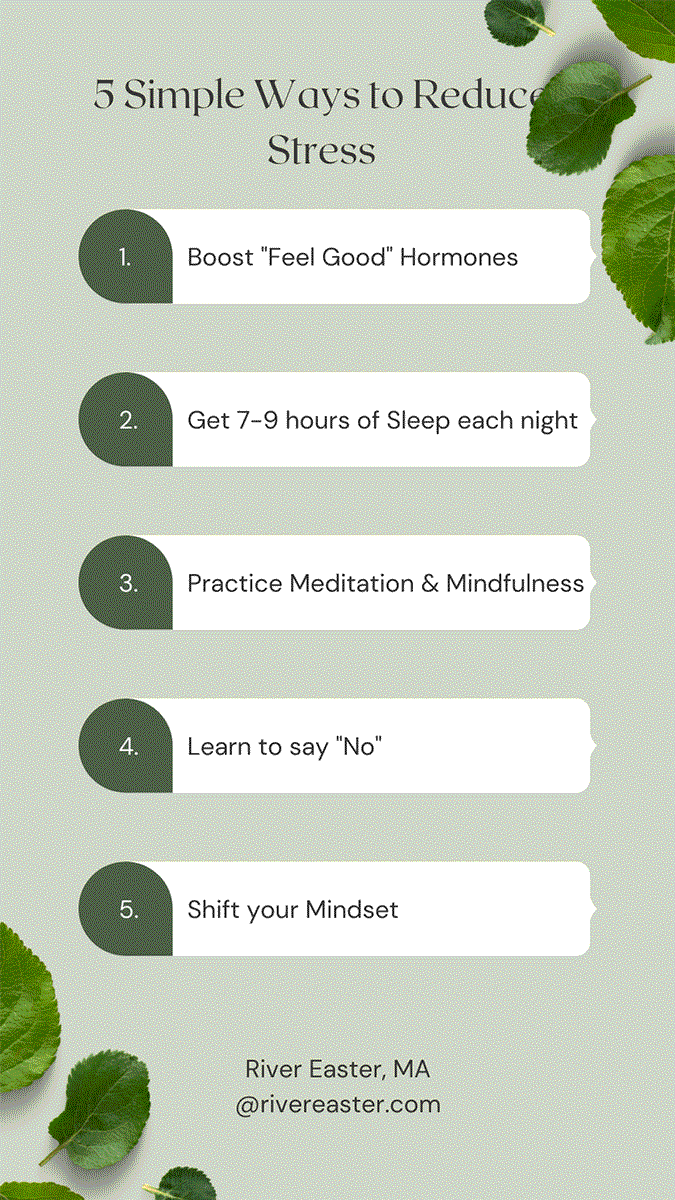“I’m so tired” or “I’m stressed.” is a common response when I ask a person how they are doing.
It happens a lot!
Studies show these people aren’t alone.
The American Institute of Stress states that 83% of US workers suffer from work-related stress, and a whopping one million workers miss work EVERY day due to stress!
Women are more stressed out than men according to a study done by the American Psychological Association.
When we are overly stressed, hormones release in the body, which may lead to high blood pressure and imbalances in our bodily systems.
Our modern society values high productivity in demanding jobs with increased workloads. Before the pandemic, the work environment was known as a place of VUCA, which stands for volatility, uncertainty, complexity, and ambiguity.
Certainly, the pandemic has exacerbated the stress in the workplace with even more demands and rapid changes both in our jobs and personal lives. These contribute to increased stress levels and affect our health and well-being.
In one study, the researchers found that numerous countries “have seen a dramatic increase in absenteeism during the last 10 years particularly among women, due to health problems. These include burnout, depression, muscular pain, headaches, gastrointestinal problems, and so on. Most of these disorders have been regarded as stress-related…”
We evolved to endure a few moments of high stress (e.g., fleeing or fighting saber-toothed cats) and then to recover with long periods of rest. The stress response protected us. Now it may be causing us harm, however. In our current society, the scenario is flipped—we have lots of stress (mostly psychological or psychosocial as opposed to a physical threat) with very little time to rest and recover.
When stressed, the body releases the hormone cortisol, which elevates blood pressure, increases heart rate, and redistributes blood flow. Consistently high levels of the stress hormones contribute to mental and physical health issues such as cardiovascular disease and reduced immune and cognitive functions. High levels of cortisol increase insulin resistance and can result in type 2 diabetes.
Of course, this is your classic catch-22. High-demand and high-stress environments are exactly where you need to be at your best! They require you to make well-thought-out decisions, to problem-solve, reason, and remember. However, being under stress reduces your ability to access these higher cognitive functions.
So what’s the answer? Quit your job?!
For most of us, this isn’t a viable answer. For some, this might be an option. But what if there is a way to navigate these situations with more ease, grace, and less stress?
The good news is there are simple ways to take back your life and reduce the stress in your life.
Here are five simple ways to help reduce stress:

“Our anxiety does not come from thinking about the future, but from wanting to control it.”
—Kahlil Gibran
If you could have done it, you would have. I’m here to support you in getting to your next level. To help you live a life that you would love. You may not even be sure what that is right now. But I know that you do know what that is. You just need some support, inspiration, and accountability to get there.
It is my mission to help you go from surviving to thriving. It is way easier than you think.
Book a complimentary session with me! Go to www.ScheduleTimeWithRiver.com
1. Do Activities That Boost the Feel-Good Hormones
You can boost your “feel good” hormones—endorphins, dopamine, serotonin, and oxytocin by doing these activities:
- Exercise
- Yoga
- Walking in nature
- Laughing
- Spending time with family and friends
- Affectionate touch and hugging
2. Sleep
Lack of sleep reduces memory, cognitive function, and ability to heal. You can improve your sleep by setting up nighttime routines like dimming the lights two hours before bed and going to bed at the same time each night.
3. Meditation and Mindfulness Practices
Research shows that as little as 12 minutes of meditation or a mindfulness practice each day will help maintain your performance in stressful environments.
4. Learn to Say No
It is important to have time to relax and “do nothing.” These times are highly valuable to your health and well-being. Practice saying no so you can say yes to yourself and your health.
5. Shift Your Mindset
You think about 70,000 thoughts per day. The question is are they positive and peaceful thoughts, or are they terrorizing you? Most people haven’t been trained to focus or align their thoughts with their goals or in a way that will enhance performance, confidence, and sense of well-being. Shifting your mindset is a leverage point. It costs you nothing yet it has great benefits.
The first step in shifting your mindset is noticing how you are feeling and thinking. Begin to pay attention and ask yourself, “What am I feeling? What am I thinking?” Is this life-giving? Is this in alignment with my goals? Or am I going down the rabbit hole of “what ifs” or are my thoughts producing more anxiety and stress?
If your thoughts are more anxiety- and stress-producing, do something that is enjoyable. Shift your state of being by taking a walk, thinking of something that makes you happy, or remembering something that you are grateful for, or just listen to some good music.
Each time you shift your mindset, you are rewiring your neuro-pathways. You are training your mind to be in a more positive and “abundant” mindset. You don’t have to do this perfectly. Each time makes a difference. Celebrate that you did it once. Rewiring and mastering your inner game takes practice, practice, practice. Keep it up.
Write this affirmation on a sticky note, and say it to yourself three times each day:
Every day and in every way, I’m getting better and better.
Watch the magic begin!
You are a creative being. You are creating your world at each moment. You choose what you are creating. Are you creating what you would love or are you creating the same old pattern?
It is hard to see the pattern when we are in the middle of it. That is why it’s so important to have someone on your side who is highly trained in noticing the patterns that are getting in the way of creating the success you want in your life. People who have a coach in their life have a 96% greater chance of success than someone who thinks they can do it all on their own.
Here is to you being the best version of yourself,
Xo
River



